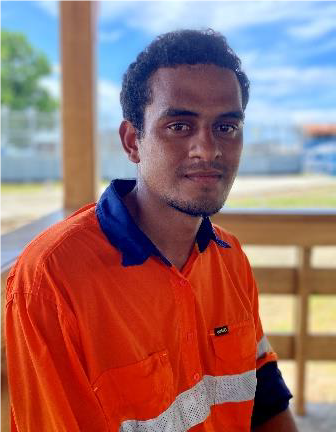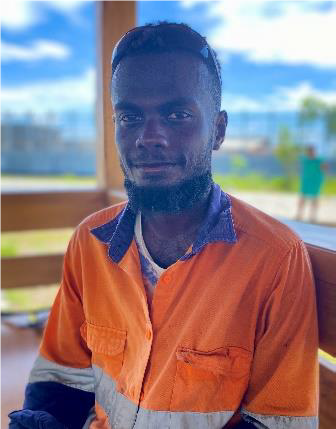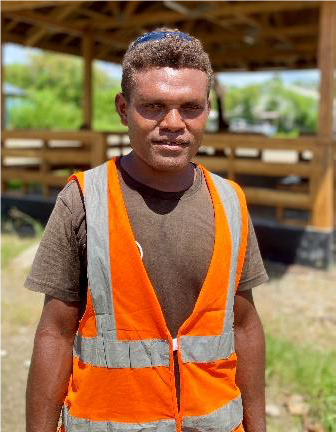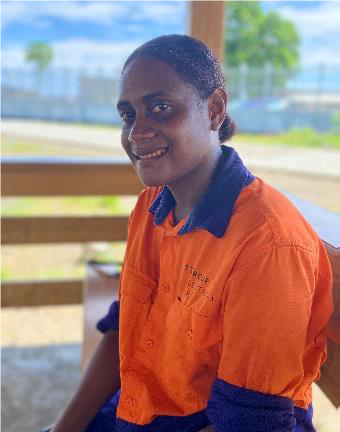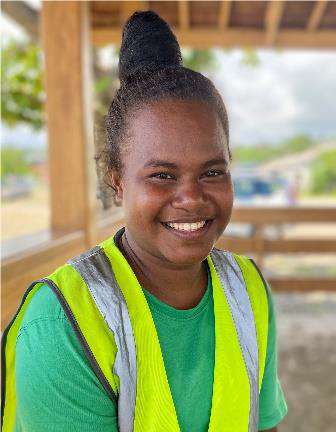

Project News from Interlocking Block Pavement Project
The first pilot project (PP1) of the Interlocking Block Pavement (IBP) Project by the Ministry of Infrastructure Development (MID) and Japan International Cooperation Agency (JICA) is about to be completed at MID Yard. Through SIG Communication Portal and JICA SI Facebook, the Project has called for interested external participants to join the activities of PP1. Since then, interested participants have gathered and worked with the Project team.
One of our participants, Mr Keith Habu, is in his final year of a Diploma in Civil Engineering at Solomon Islands National University (SINU). Keith has learned about IBP at SINU and is familiar with the technical side but has never had a chance to gain practical experience. Keith shares his positive experience, expressing how much he has learned. “IBP will be highly effective in the Solomon Islands, where the employment rate is low. IBP does not require big machines and can create job opportunities for local people,” he believes. Keith hopes MID will continue disseminating this technique to the provinces and eagerly looks forward to joining future IBP projects.
Another voluntary participant from SINU Civil Engineering, Mr Abraham Kulakavele, has been an active project team member since the road’s base course of PP1. Through this IBP project, Abraham has not only gained technical skills such as “how to lay blocks” but also learned how to organize and manage a working group. His experience is a testament to the Project’s practical benefits. Abraham says, “Now, only the big companies do the road works, but with IBP, local participants can also take initiatives.” Abraham is also in his final year at SINU.
A private builder from Central Honiara, Mr Timo Abeau, who joined the IBP project in early April, also claims his experience with the Project has been “too good.” “It’s my first time, and I’m learning a lot about IBP.” “IBP is easy to make and maintain. It has been very interesting!” Timo thanked MID, JICA and the project team for the free learning opportunity. Timo wishes the IBP technique to be well developed in Solomon Islands and disseminated throughout the country to be applied to all feeder roads that need improvements and rehabilitation.
Ms Roina Mamani, a construction student from Don Bosco Technical Institute, is a casual worker at MID Yard. Roina joined the Project in February. “IBP is a new technique for me, and it’s been an exciting experience. I love to learn how to install these blocks,” Roina says. She wishes to encourage more women and girls to participate in the IBP project. “Road construction is very much male-dominated, but with IBP, women can do the job just as men,” Roina claims. Her story is a testament to the Project’s inclusivity and potential to empower women in the construction industry.
Ms Cynthia Dalo is another student from Don Bosco. “I have never seen the IBP before, and learning how to lay these blocks has been interesting and enjoyable; plus, it’s much better than staying at home,” She says. I try to do the work that girls can do.” Cynthia is another key member of the Project and wishes to continue participating and volunteering. Cynthia’s story is another example of the empowerment and equal opportunities the Project provides.
Mr Luke Namson is an IBP project staff member who has been working closely with the JICA consultant team since the beginning of the Project. Luke was also a member of the Honiara Transport Masterplan Project funded by JICA and has years of experience working with the JICA project team. “This might be a small project but very effective,” Luke says, “IBP is a new technique in Solomon Islands, easy to fabricate and construct, and also creates employment for many graduate students and local participants.” While the Project is until early next year, Luke hopes to enhance the IBP technique in communities and provinces. Luke also plans to continue his studies and hopes to become a certified engineer in the near future.
The Project team is now preparing the second pilot project (PP #2) at Hill Street, Central Honiara. PP#2 will start by mid-May and expect to complete in by end of June 2024.


